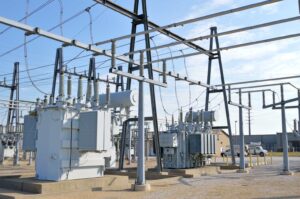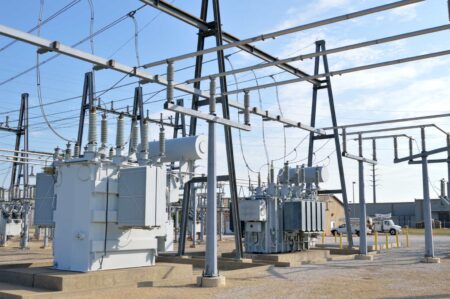Hudson Pacific Properties (NYSE:HPP) has shed an intense amount of value over the last few months as the office REIT faces ever-higher vacancy rates, falling net operating income, and cash rent that’s dipping. HPP last declared a quarterly cash dividend of $0.05 per share, kept unchanged from its prior distribution and $0.20 per share annualized for a 4% dividend yield. The Series C Preferreds (NYSE:HPP.PR.C), currently trading at $12.80 per share, would dip as low as $11 per share, or 45 cents on the dollar, but now offer a 9.3% yield on cost on the back of the $1.1875 per share annual coupon. I previously owned a significant stake in the preferreds but disposed of this a year ago due to the prolonged Hollywood strikes. Their pricing remained incredibly stable at roughly $14 per share, but continued office weakness in urban West Coast office markets has taken a toll. The preferreds are not yet a buy, as poignant risks facing HPP need to be assessed since I last covered the REIT.
Hudson Pacific Properties Fiscal 2024 Second Quarter Supplemental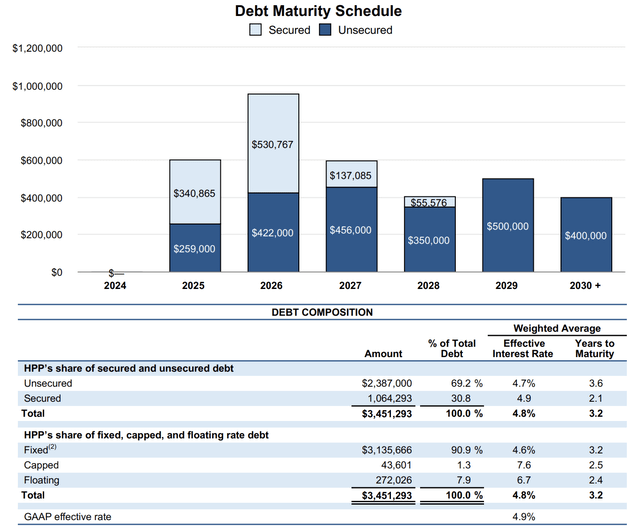
The REIT faces no more debt maturities in 2024 with $600 million coming due next year and $952.8 million maturing in 2026. These are currently broadly priced at variable rates and split between secured and unsecured debt. The most near-term debt maturity is secured against HPP’s Element LA 12-acre office campus in Los Angeles. The asset is fully leased. Critically, the bulk of HPP’s secured debt is priced at SOFR plus, a fixed rate that ranges from 1.10% to 3.10%.
Hudson Pacific Properties Fiscal 2024 Second Quarter Supplemental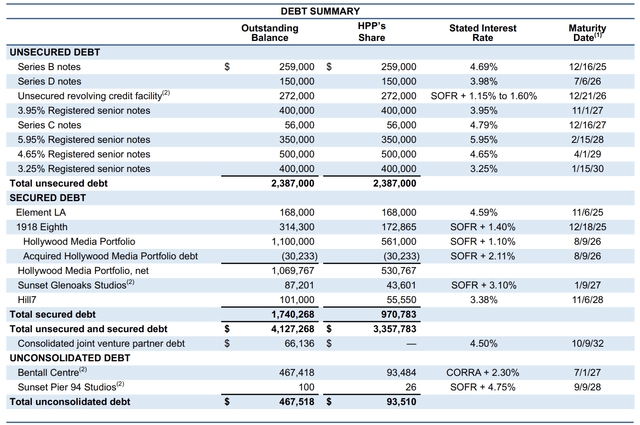
This heightens the importance of pending Fed rate cuts, which the CME FedWatch Tool has priced at a 100% probability of occurring at the September 18th FOMC meeting. To be clear, HPP is currently paying $11.58 million in annual interest on its share of 1918 Eighth, hence, every 25 basis points cut in the Fed funds rate would see this interest expense dip by roughly $430,000. This adds up across all layers of HPP’s debt, and the commons should see a boost on the back of consecutive rate cuts.
Occupancy, Leasing Volume, And Free Cash Flow
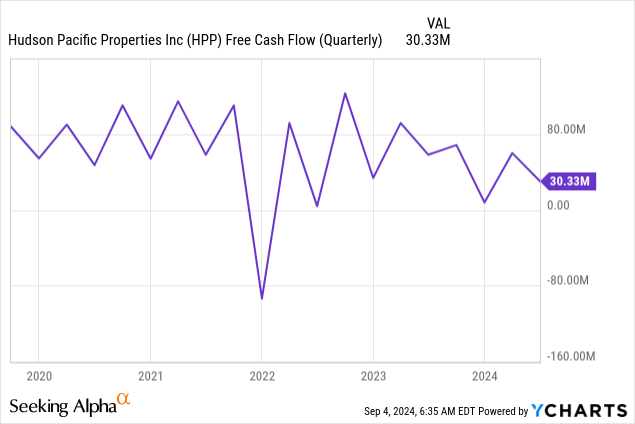
HPP generated fiscal 2024 second-quarter revenue of $218 million, down 11.1% over its year-ago comp but a beat by $1.17 million on consensus estimates. FFO at $0.17 per share was in line with consensus, but down from an FFO of $0.24 per share generated in the year-ago quarter. The REIT comfortably covers its current dividend with second-quarter FFO, as intense debt reduction remains the main objective of management.
Hudson Pacific Properties Fiscal 2024 Second Quarter Supplemental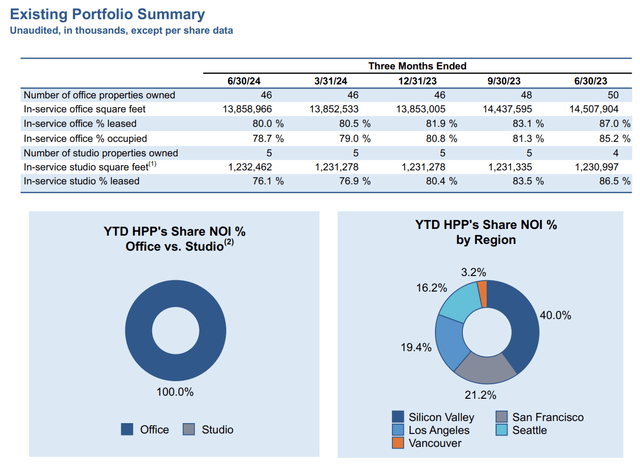
HPP owned 46 office properties spread across 13.86 million square feet as of the end of its second quarter. This was 78.7% occupied, an occupancy dip of 30 basis points sequentially from the first quarter. The REIT is not entirely dependent on San Francisco, with the city forming 21.2% of same-store cash net operating income of $105.2 million at the end of the second quarter. This dipped $14.1 million year-over-year on the back of two tenant move-outs at 1455 Market and Sunset Las Palmas Studios. HPP’s studios have faced a weaker recovery than expected after the Hollywood strikes, even as the recent Teamster’s ratified contract dispersed the prospect of further disruption to filmmaking in the Los Angeles area. Hollywood productions have dropped to 80 from 100 as other filmmaking markets offer competitive tax incentives to production.
Hudson Pacific Properties Fiscal 2024 Second Quarter Supplemental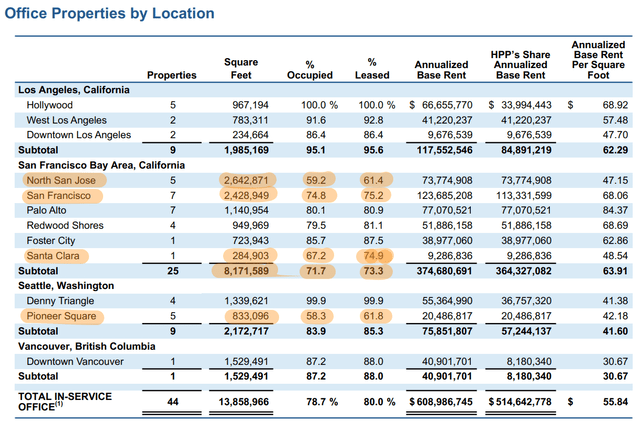
Continued weakness in the San Francisco Bay Area represents HPP’s core headwind, with its North San Jose properties 59.2% occupied at the end of the second quarter. San Francisco also continues to lead the US in vacant office space, with the city’s vacancy rate at 25.4% at the end of July, up a significant 420 basis over the year-ago period. The REIT executed 82 new and renewal leases covering 539,531 square feet during the quarter as cash rents dipped 13.3% over its year-ago level due to the new 21-year term lease for 157,000-square-foot of space with the City and County of San Francisco at 1455 Market. Excluding this would have seen cash rents increase by 0.9%. GAAP rent was up 2.6% during the quarter, or 8%, if 1455 Market was excluded.
Hudson Pacific Properties Fiscal 2024 Second Quarter Supplemental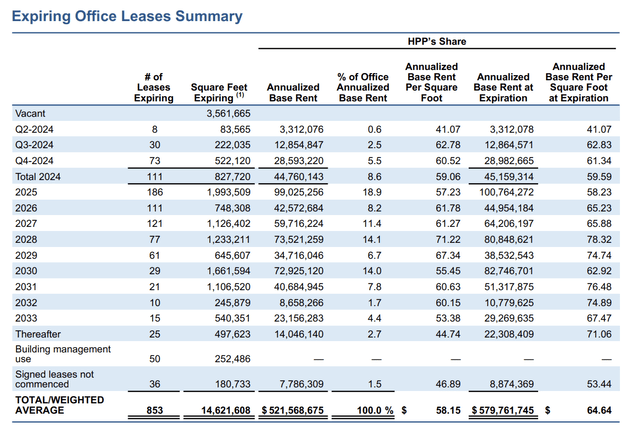
HPP was set to see leases covering 8.6% of its annualized base rent set to expire in 2024 as of the end of its second quarter, with a material 18.9% of leases set to expire in 2025. Hence, with occupancy already seeing weakness, 2025 might offer more headwinds for the REIT against such a large increase in lease expirations. While the strong common share dividend coverage bodes well for the preferreds, and safety set to potentially be ramped up by Fed rate cuts, the large number of near-term lease expirations have placed a bullish position on HPP on hold.
Read the full article here




